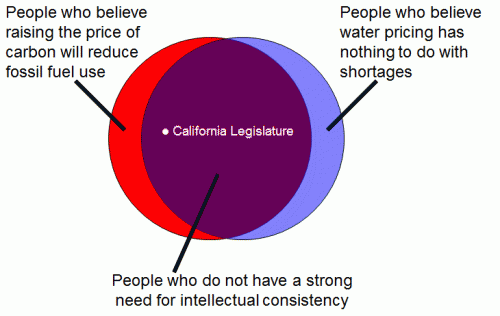I am a big fan of the Mises blog, but in this post on a Boston Globe editorial they miss something pretty substantial. S.M. Oliva takes as a starting point this absurd editorial on the pending XM-Sirius merger:
the proposed merger of the two US satellite radio firms is premature at
best. At this point, it should be rejected. In half a decade, the two
firms have gone from barely broadcasting to throwing up their hands in
defeat. But it is hardly clear that the nation's two satellite radio
firms will wither and die unless they unite, or that a merger would
benefit consumers.
Oliva does a good job at debunking this argument, but why bother? It is patently absurd. How is can one possible define a market at just satellite radio? Where have I heard this same ridiculous argument before? Aha! Right in the press release from the National Association of Broadcasters, the organization most threatened by satellite radio and who would benefit most if it would just go away.
When
the FCC authorized satellite radio, it specifically found that
the public
would be served best by two competitive nationwide systems. Now,
with their stock prices at rock bottom and their business model in
disarray
because of profligate spending practices, they seek a government
bail-out to avoid competing in the marketplace.
Of course, even a combined XM-Sirius would have to compete in the marketplace -- in fact with the members of the NAB, whose asses Satellite has been kicking for a few years.
Oh, but here is the good part: the Boston Globe's parent company is a member of the NAB, owning two radio stations and 9 TV stations. So in fact, the Globe was not editorializing in favor of the consumer, but in fact was shilling for its own trade group, working to weaken a dangerous source of new competition for its own broadcast radio and TV stations. And nowhere in the editorial does the Globe disclose this massive conflict of interest. Which makes this closing line a joke:
A Sirius-XM merger would snuff out competition within a potentially
lively market at a time when the technology is still evolving. And by
creating one dominant satellite radio firm, the move would likely keep
new rivals from emerging in the future.
As any economist will tell you, it is ridiculous to define satellite radio as a "market." At its smallest, the market is reasonably "radio." The delivery mechanism of radio (satellite vs. terrestrial) is meaningless to the definition of a market (the editorial tries to deal with this logical fallacy by creating a straw man that the market does not include iPods, when of course the main issue is that it does include terrestrial radio stations). The Globe, along with the NAB whose talking points the Globe is just repeating in this "editorial", are in fact interested in reducing competition for themselves, not enhancing it.
Oh, and by the way, if approving a merger of broadcast or media companies is a "bail-out," then I invite the Boston Globe to calculate how much of a bail-out the Times corporation has been given, as the government has approved the merger of the NY Times, Boston Globe, IHT, 20 other papers, 9 TV stations, 2 radio stations, and 35 commercial web sites. And by the way, what is the market share of each of their papers in their own local "markets?"
I will leave you with a quote from Milton Friedman vis a vis licensing but entirely appropriate here:
The justification offered is always the same: to protect the consumer. However, the reason
is demonstrated by observing who lobbies at the state legislature for
the imposition or strengthening of licensure. The lobbyists are
invariably representatives of the occupation in question rather than of
the customers. True enough, plumbers presumably know better than anyone
else what their customers need to be protected against. However, it is
hard to regard altruistic concern for their customers as the primary
motive behind their determined efforts to get legal power to decide who
may be a plumber.
